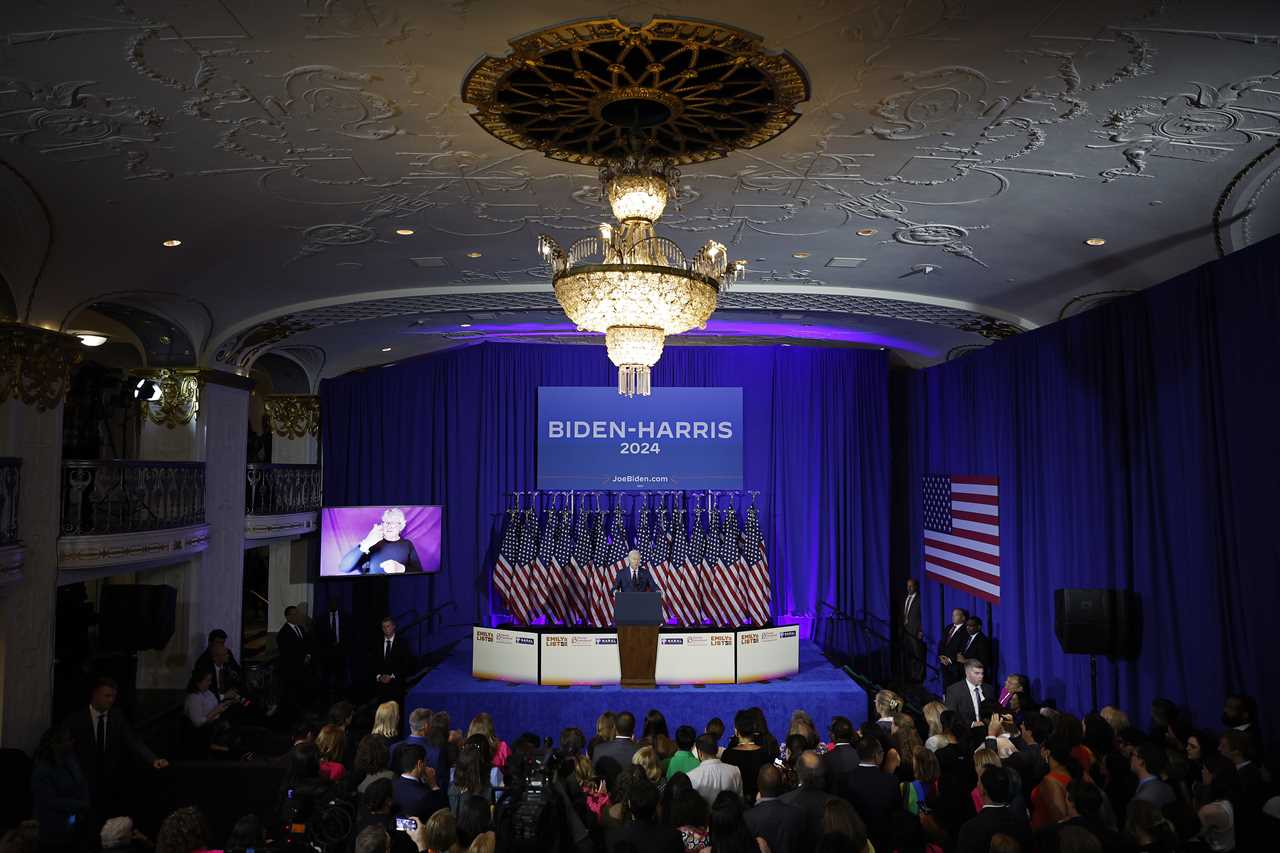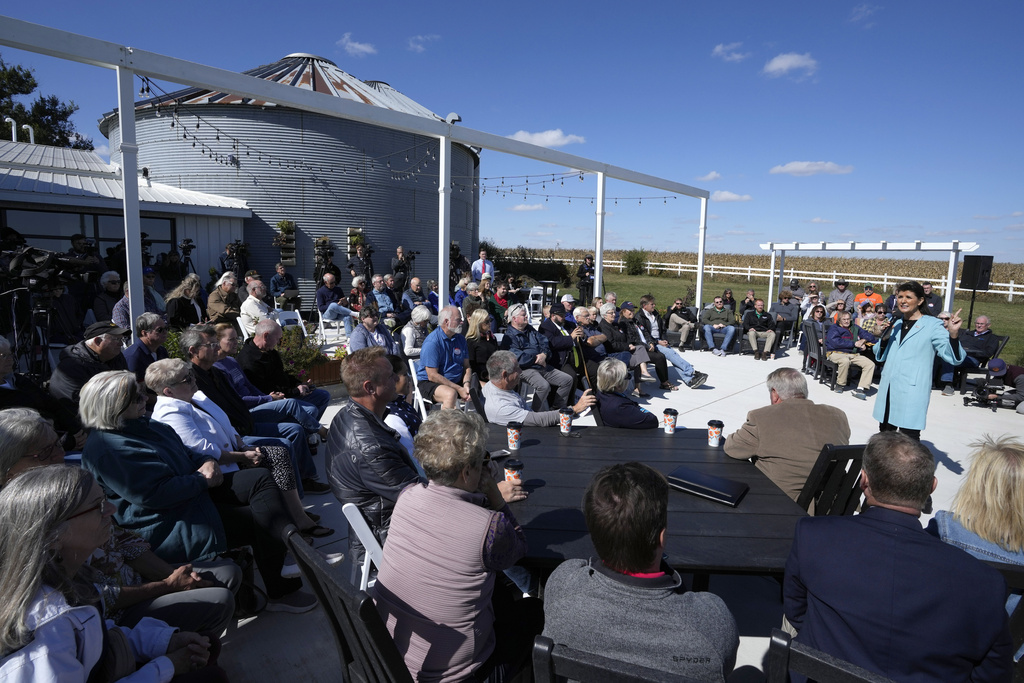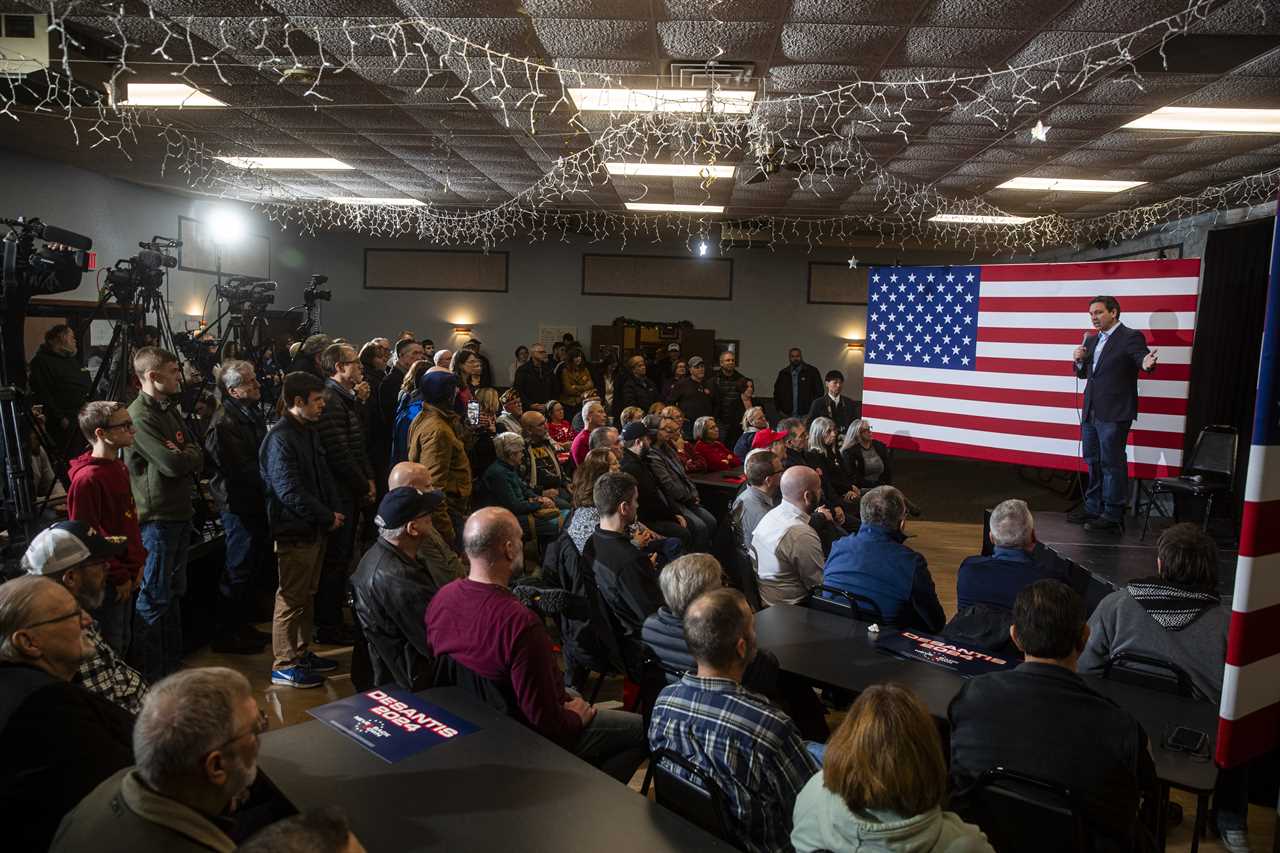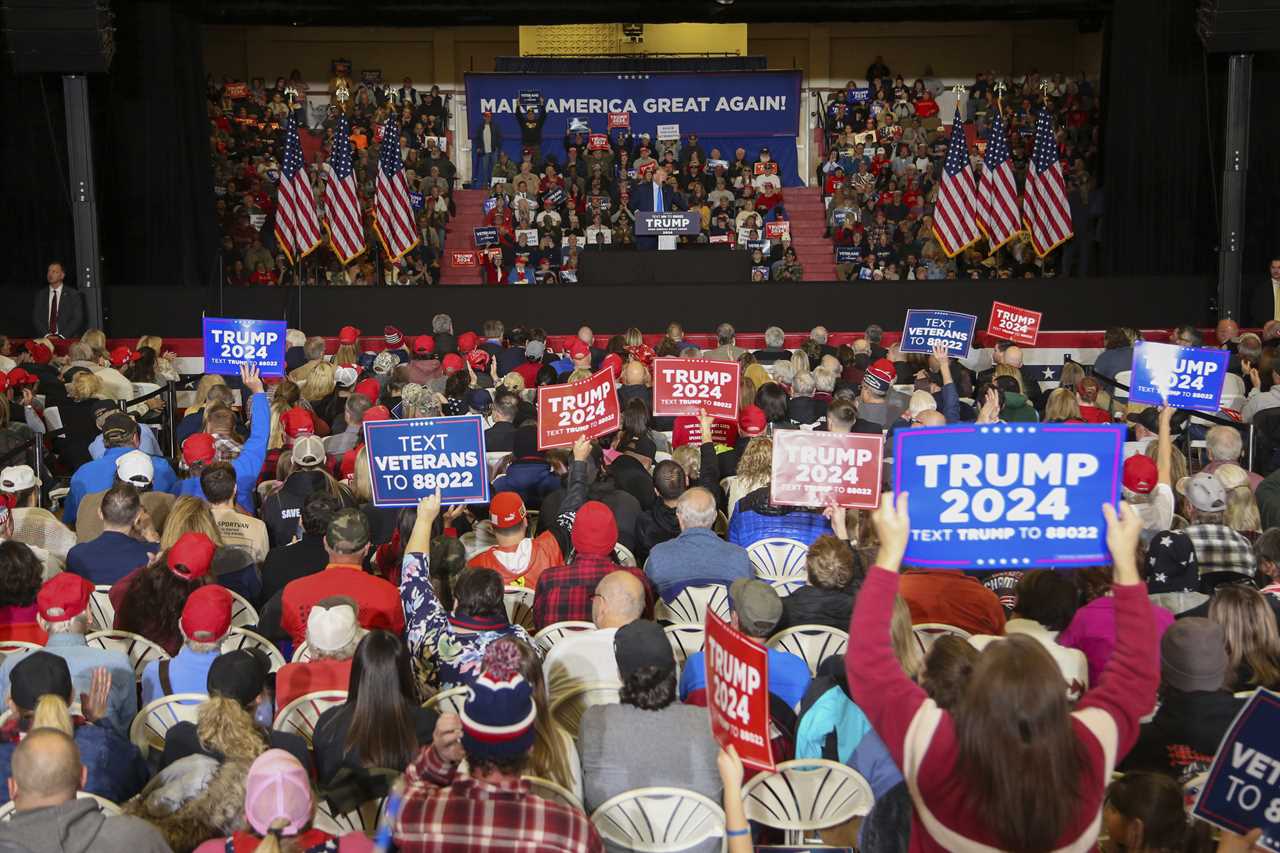
A political campaign’s advance person is supposed to be invisible. But if you look closely, you see them everywhere.
Lighting that brightens a politician’s face in a dimly lit room, making it pop in photographs on the front page the next day. Splurging on signs that feature the candidate’s name on both the front and the back so the TV cameras pick it up regardless of what angle they’re shooting from. Finding just the right kid who will smile behind the elected official during a rally — and definitely not yawn.
These and a zillion more tiny details are what keep people like Doug Landry up at night. He’s an “advance man” — someone who travels in advance of candidates to set up everything you see when they appear on TV, from stages and lighting to signage and hay bales. (It’s the kind of old-fashioned retail politicking that’s happening less in a Trump-dominated cycle.) “I describe it as the best job in politics that nobody has really ever heard of,” he says. Landry has worked on hundreds of events and trips for politicians, including President Joe Biden’s drive-in fireworks show after the Democratic National Committee convention. He got his start on Hillary Clinton’s 2008 presidential campaign, and now he runs his own firm, 50 Thirteen, which does event consulting for Democrats like Sen. John Fetterman of Pennsylvania and Rep. Barabara Lee, who’s running for Senate in California.
He’s also weighed in on the GOP primary’s advance work on X, formerly known as Twitter, grading each Republican for their launch days. (Read on to find out who’s killing it and who’s falling flat.) We asked him to help us pull back the curtain on this little-known universe, sharing his insights into how a town hall or a meet-and-greet can yield evidence for how professional — or not — a candidate’s campaign truly is.
This interview has been edited for clarity and brevity.
Schneider: Can you run through some of the biggest events you’ve worked on that people might be familiar with?
Landry: The biggest one that hopefully most people saw was the fireworks in Wilmington, Delaware, after Joe Biden's convention speech at our weird outdoor parking lot drive-in show. That was the first time we tried it out. It obviously worked really well. We took that show on the road for the rest of the general election.
I also did the Amtrak train tour after the first debate. Joe Biden hopped on a train in Cleveland and took it through Ohio and Pennsylvania. This was still the height of Covid, so a lot of precautions to get on a train with him to keep all of that safe. And the very, very last event of the campaign was a Lady Gaga concert outside Heinz Field in Pittsburgh.
Schneider: What’s the best piece of advance work you’ve ever seen from a campaign?
Landry: There’s two bests. There’s, “What is the very prettiest picture you can do?” And there's dozens of examples of those. Go back to Bill Clinton in front of the Grand Canyon signing legislation or Barack Obama under the St. Louis arch with 80,000 people.
But then there's also a category of, “Where did the advanced team make the most difference?” And, it’s a really sad example, but I think that Hillary Clinton's 2016 concession speech is probably one of the best recent examples. Everyone expected her to be speaking on this unbelievable stage. She was going to be in the atrium of the Javits Center with a glass ceiling on a stage shaped like America with flags in the distance. It would have been stunning. But instead, things did not go our way. And the team at 3 a.m. needed to find somewhere for her to give a speech at 9 a.m.
Schneider: Which couldn't be the Javits Center, obviously.
Landry: Which couldn’t be the Javits Center. So, they're sitting there — Tuesday night into Wednesday, asking themselves, ‘Where can we gather 700 people and 300 press and give a speech in six hours?’ Beginning at 3 a.m., this team found a hotel that would answer their phone call — I think they just, like, asked the front desk and rented a ballroom. One guy ran to a storefront and bought lighting. There was no time to rent it, so they bought it. They used hotel staging and cobbled this thing together.
If you go back and look at C-SPAN, Hillary Clinton looks resplendent in purple, giving this very gracious speech, the lighting is perfect. There are teleprompters. There's flags perfectly pressed. None of which existed even three hours before that moment. I think that it's a poignant and sad example for those of us who tried to get her elected for president twice, but it's actually one of the proudest moments that we had as a team.
Schneider: What is the single worst advance work you’ve seen?
Landry: The fun answer is Four Seasons Total Landscaping. But bad for me is where the involvement and efforts of an advance team made something demonstrably worse. I would point to Donald Trump's first rally back after Covid, in-person, which was in Tulsa, Oklahoma. They were looking to fill an arena with 10,000 seats, and they did two things wrong — they allowed their RSVP system to get gamed so badly by hundreds of thousands of people. They really started to believe that tens of thousands of people were coming, so not only did they build out this arena inside, but they had this enormous overflow space set up outside. And then nobody came. Even the arena itself was about a third empty. They had to turn lights off. They had to hold Trump to try to get more people in, and then it's a ghost town outside. The story is, immediately, Trump has a problem. And then, literally people got Covid at that event, and famously died as a result, but I'll leave the epidemiological failings separate.
Schneider: Do you have an emergency kit that you carry around for events, and if you do, what's in it?
Landry: No advance person would ever check a bag, so what you do have to bring with you has to fit into a 22-inch roller board. No advance person would be left without a roll of duct tape — or even better than that, there's a kind of tape called gaffer tape that won't leave a mark and easily comes off that is used in television production. So, a good roll of gaffer tape. A measuring tape — don't leave home without it. And then a bunch of Sharpies. Either for the candidate to sign autographs and sign posters or just to write on signs or make notes. I have coats that I find Sharpies in from a decade ago. Those are the big three.
Schneider: Alright, let’s get into the good stuff. Let’s start with this image of Nikki Haley. What does the advance work say about the candidate?

Landry: What grabs me about this picture is just how little advance is apparent. Now, there's a team here that did this, you can tell. She has a microphone in her hand, there's a speaker visible, the press in the back of the room are on a riser and have a malt box, which is a piece of electronic hardware where the microphones’ audio is cleanly fed to all of the press. But there's nothing else. They’re letting this farm speak for itself. It just screams Iowa. You've got a rusty silo. You've got a white picket fence. You have corn, delicately aging, ready for harvest. A lot of advance teams would have come into this and hung 10 “Nikki Haley” banners all over everything, red-white-and-blue bunting all over everything. They would have dragged some hay bales — and there's nothing wrong with hay bales — all around the candidate, and really made it look quite contrived. In this case, it looks beautiful, and they also probably spent $1,000 or $1,500 on this. That's just money back in their campaign’s pockets.
Schneider: Turning to Ron DeSantis. What do you see in this image?

Landry: DeSantis, number one, they put [him] on a stage no matter what, which isn't necessary, especially in this room. There's, what, 70 people? You're also putting him closer to this ugly ceiling. This event is produced by his super PAC, and you can tell because the sign on the table is in what I call the “Terminator font” — that DeSantis 2024 sign — and then you can see the “Never Back Down” logo on it. He doesn't have control of how this site looks. He is a guest of this super PAC. It does not look great. If I were doing this exact site, I would try to put him in the center of this room and put these voters all the way around him. And I just wouldn't put him on a one-foot stage in a room that has nine-foot ceilings.
Schneider: Do you think they put him on a stage all the time because they’re concerned about his height?
Landry: Obviously. It's not even just being cute about it. Obviously his height is something that they are cognizant of. But if you put him standing, among people that are seated around him, it would actually have the same effect. His team is doing this autopilot, cookie-cutter thing that doesn't work for him.
Schneider: OK, let’s turn to Donald Trump. What do you see in these images?

Landry: They're similar. Every one of these are similar because it has been 8½ years since Trump came down that escalator, and his team has probably executed somewhere around 3,000 events in that time, and the work that they are putting on the field is actually very proficient. If you look at any Trump event, he's using the same lectern and it has the same podium sign on it at every one. He either has people behind him or, more recently, he’s [used] … a step-and-repeat, which is the backdrop that has logos or text on it, rather than people behind him. It's a little bit more controllable for him and his team. Then, you also don't have to do a lot of hard work, which is to pick the people that go behind.
And if we're looking at the Claremont photo, the black fabric under the lectern is actually two sheets of armor that the Secret Service requires their protectors to have in front of their lecterns. That's another reason that a lot of his sites will look the same, which DeSantis and Haley don't have to worry about. There are structural limitations from the Secret Service detail that require the bike rack, require a buffer of about 10 feet from the crowd to the stage. These photos of Nikki Haley and Ron DeSantis, sitting in these quintessential Iowa and New Hampshire settings — Donald Trump, actually, even if he wanted to, would not do them.
As far as, how does that work into the race? It feeds into the “overwhelming favorite” or the president-in-waiting or, in this particular case, nominee-in-waiting. A lot of the effect of his whole thing is a bizarro-land White House where he's got Trump Force One, the big motorcade, the Secret Service with the sunglasses and the wire to their ear. It all looks the exact same as when he was president, except for, he just doesn't have the seal.
Schneider: What are the small things you notice at an event that says, this is amateur?
Landry: The number-one, telltale giveaway, every time, that it's an amateur production is a bad sign on the lectern — or no sign at all. Because in our modern TV era, a lot of people watch on mute, it's gonna get clipped and put online without captions or without audio.
Schneider: What about the opposite side of it? What's a sign that something was clearly done more thoughtfully?
Landry: Lighting. When an event is well lit, it’s far and above any other element in terms of making an event look so much better, both in still photos and on TV. It’s expensive. It is hard to get right. It doesn't appear in the camera. It is, kind of, an afterthought to most people. “Oh, do we even need lighting? We're in a room where there are lights above us. Why is that not OK?” Well, that will look like garbage on TV.
Schneider: How dramatically did you have to rethink events during peak Covid?
Landry: It was insane. To be safe during Covid, based on the recommendations. … Joe Biden, at a UAW event, is one of the starkest examples of the people sitting in the plastic, white circles. …There were, like, 12 people in the audience for a presidential campaign event and they were sitting in plastic circles.
Schneider: Anything about advance work on the Biden campaign in 2020 that you think might surprise people?
Landry: Vice presidents only get six months of Secret Service coverage after they leave office. It's funny to think about now, but in 2018 and 2019, Joe Biden would drive himself around, both from his rented home here in Northern Virginia and then in Wilmington. For events, he would have staff, but otherwise, he was just bopping around town. Then, when the campaign started, we had one security individual travel with him from the start. So, the first trip to Iowa that I did, this guy came with him. I think he was some sort of former Secret Service person hired by the campaign.
There's a famous [moment] in California when Dr. [Jill] Biden and Symone Sanders physically removed somebody from the stage.
Schneider: Did you do the advance work on that event?
Landry: I did not.
Schneider: In this digital age of politics, is advance work still important?
Landry: There's a very recent A-B test of why this matters. I graded, on Twitter, for fun, every Republican’s launch event, from Donald Trump all the way down to Doug Burgum.
The best one of the major candidates was Nikki Haley. They had a professional, hired advance team in her home state, a big rah-rah rally that got her campaign off to a good start with a lot of good footage. On the flip side, Ron DeSantis’ choice to launch his campaign in a digital form with a Twitter space, even before it melted down, was a poor decision, even if it had gone well technologically. There was no way to put that on the front page of the paper.
The story from that is Nikki Haley, punching above her weight on the rise. And then you have Ron DeSantis — what happened here? What went wrong? Why does this governor, who holds himself out to be so competent, why does his campaign not shoot straight?
----------------------------------------
By: Elena Schneider
Title: Confessions of a Campaign ‘Advance Man’
Sourced From: www.politico.com/news/magazine/2023/12/30/confessions-of-a-campaign-advance-man-00133148
Published Date: Sat, 30 Dec 2023 07:00:00 EST






